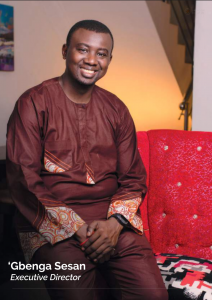
From the Executive Director’s Desk
2019. What a year! As the year cruised to its end, I looked over our proposed 2020 budget and took a mental trip back to January. While our work remains inspiring, as more under-served youth are connected to life-changing opportunities across Nigeria and we keep the flag of digital rights flying in the regions of Africa where we work, it is obvious why we had a great year.
Adeboro. Adeboye. Amina. Angela. Babatunde. Bilikisu. Bulanda. Emmanuel. Gabreal. Ihueze. Lilian. Odinaka. Olayinka.
Rebecca. Rigobert. Saviour. Seyi. Tosin. Ubong. Those are the women and men who made Paradigm Initiative’s 2019 rock, and have spent time drawing up what would definitely be an even better 2020. Not only are these heroes why we do what we do, their openness in 2019 has laid a foundation for an organisation that is committed to an ongoing Best Place to Work program.
Adeboro started working as our Legal Officer even as an assistant, and I am excited to see her come into that role at a time when we need her legal, creative and other skills the most. Adeboye came to PIN as a Community Manager for a 2-year project but is now a member of the leadership team, and it is great to see him use his diverse skills in leading our digital rights work in Anglophone West Africa while also inspiring team leads across other regions. Amina is called an all-rounder by teammates because of how versatile she is, and she has demonstrated this with the students in Kano, an office that now has more women staff and students than all others.
Angela, the soft-spoken but firm teacher of code and decorum, who started with us as an intern, is in her element when with her Ajegunle students, a group she continues to inspire to greatness. Babatunde started as my Executive Assistant but it wasn’t long before I realised that we had to maximise his research and writing talent, which is why he now leads Paradigm Initiative’s research efforts. Bilikisu always has a smile on but when it comes to keeping our Kano office running smoothly, her assistance leaves no one in doubt.
Bulanda joined us as a Google Policy Fellow but we couldn’t let her go, and I’m glad she chose to stay on to lead our Southern Africa Digital Rights program with her trademark efficiency. Emmanuel loves PIN and PIN loves him, considering how he started as a Digital Rights and Inclusion Media Fellow, then became a Google Policy Fellow with us and now leads our bilingual Communications team. Gabreal plays musical instruments, sings, dances, makes clothes, assists with HR, leads our Ajegunle training program, is extremely curious about policy and has brought visible excitement to the Ajegunle LIFE program.
4 Paradigm Initiative | IMPACT REPORT 2020 Ihueze helped PIN start our South East Nigeria operations in Aba and you can feel the commitment within minutes of
meeting him. Lilian started at the PIN front desk but has grown into an administrative support role that team members and I benefi t from massively. Odinaka teaches our Aba LIFE students, works to support the smooth running of the program, and is clearly excited about the growth of the program.
Olayinka is the oldest serving team member (after me), has risen through the ranks and is now starting out with full-time oversight for something he’s always supported with—all things tech and admin. Rebecca, a former Google Policy Fellow with us, leads our Digital Rights program in East Africa, and she is one you want on your team because in addition to
wearing passion on her sleeves, she delivers. Rigobert started as a Google Policy Fellow too but has since grown into our Francophone Africa lead, and it is to his credit that the region now gets more love in the community.
Saviour joined us ready to go, as the most recent addition to the team but one whose creative rendition of all our work breathes life into them. Seyi is the fi nance lead every leader needs on their side; she is eff ective, won’t hold back what you need to hear and is responsible for PIN’s expanding asset base across 9 offi ces. Tosin is the member of the leadership team that makes sure that we live up to our desire of connecting under-served Nigerian youth with life-changing opportunities, and his love for the demographic is matched only by his commitment to the cause. Ubong makes sure the lights stay on in Aba and we found out during the last retreat that he’s both a great dancer and diff erent
kind of swimmer.
These are the humans of Paradigm Initiative, the ladies and gentlemen who give me the confi dence to tell the world that we do great work, and whose daily eff orts help translate our vision into action. As we add more team members in 2020, I trust that they will complement the star power that makes PIN, PIN. Thank you for your continued support of our work, for teaming up with these stars, our volunteers, board, fi nancial partners and others to help Paradigm Initiative build ICT-enabled support for under-served Nigerian youth and advocate for digital rights across Africa.
While our work remains inspiring, as more under-served youth are connected to life-changing opportunities across Nigeria and we keep the flag of digital rights flying in the regions of Africa where we work, it is obvious why we had a great year.
Meet the team
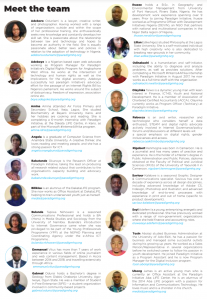
Who We Are
Paradigm Initiative (PIN) is a social enterprise that builds ICT-enabled support systems and advocates for digital rights in order to improve the livelihoods of under-served young Africans. Our digital rights advocacy program is focused on the development of public policy for internet freedom in Africa, with offices in Abuja, Nigeria (covering
the Anglophone West Africa region); Accra, Ghana; Yaoundé, Cameroon (Central Africa); Arusha, Tanzania (East Africa) and Lusaka, Zambia (Southern Africa). Our digital rights advocacy efforts include media campaigns, coalition building, capacity building, research, report writing, hosting the annual bi-lingual pan-African Digital
Rights and Inclusion Forum (where more than 200 digital rights stakeholders from over 35 countries — mostly African countries — meet to discuss, network and advance work in digital rights) and promotion of Digital Rights and Freedom legislation.
We have, over the past decade, worked to advance Internet freedom in Africa and implemented large multicountry programs and managed funding from organizations such as the Ford Foundation, the Rockefeller Foundation and Google.org. PIN has worked in communities across Nigeria since 2007, and across Africa since 2017, building experience, community trust and an organizational culture that positions us as a leading social enterprise in Digital Inclusion and Digital Rights on the continent. We have a robust partnership network made up of non-profits, youth groups, businesses, international organizations and government agencies who provide opportunities to the communities we work with. PIN has organized the Digital Rights and Inclusion Forum (DRIF) in Nigeria since 2013 and championed the drafting of, advocacy for and eventual passage of the Digital Rights and Freedom Bill by the House of Representatives and the Senate in Nigeria.
The organization has strong competencies in advocacy, media and communications, capacity building, research and coalition building, having organized Internet Policy Training/Digital Rights Workshops across Africa (in Cameroon, Gambia, Kenya, Nigeria, Senegal, Uganda and Zambia) and led efforts to promote freedom of
expression and privacy by challenging surveillance regimes (Gambia, Nigeria), intervening in Digital ID programs (Kenya, Nigeria), training security agencies on privacy and other citizen rights (Nigeria), training parliamentarians on digital rights (Malawi, South Sudan, Tanzania, Uganda, Zambia, Zimbabwe), engaging at the highest level to ensure internal government accountability on digital rights (Nigeria), bringing stakeholders together to strategize on navigating oppressive environments where freedom of expression was under threat (Gambia, Tanzania), challenging governments on Internet shutdowns around elections (Cameroon, Ghana), and developing frameworks for rights-respecting legislation (Cameroon, Gambia, Malawi, Nigeria, Togo).
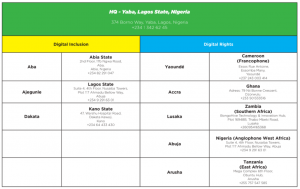
Mission
“Improved Livelihoods for Under-served
Youth Aged 12 to 28”
The Digital Rights Program
In 2019, we consolidated our efforts from the previous years, and more importantly our expansion plans in Africa. With support from partners, we expanded effectively to Southern Africa with a permanent office in Lusaka and also another expansion in Francophone west Africa with an office in Lomé, Togo. Today, with our 9 offices, we have crisscrossed all the regions of Sub-Saharan Africa and replicated some of the successes we have achieved in Nigeria.
Like every year, in 2019, we championed critical policy interventions such as campaigns leading the advocacy for the passage of the Digital Rights and Freedom Bill in Nigeria and mobilizing and coordinating advocacy against emerging legislation on “Fake News” and Hate Speech in Africa such as the Computer Crime Proclamation Bill in Ethiopia, the amendment of section 241 of the penal code in Cameroon, Nigeria’s anti-social media and hate speech bills and other legislation restricting the civic space for citizens, bloggers,
and Journalists in Africa.
Working with local partners, we have also made contributions to the draft amendment to the Constitution of The Gambia to reflect digital rights language in its freedom of expression and right to privacy provisions and called on the government to reform its media laws.
We hosted a series of workshops in different locations in Nigeria ( Anglophone West Africa civil society organizations), Senegal (Francophone Africa civil society organizations) , and Kenya (parliamentarians from southern and east Africa).
We created awareness on violations and led litigation to free jailed journalists and digital rights activists.
We push back violations in different regions including arrests and network disruptions during protests, examinations and elections.
In addition to these, we’ve successfully hosted the Digital rights and Inclusion Forum in Nigeria with delegates from more than 35 countries.
Anglophone West Africa
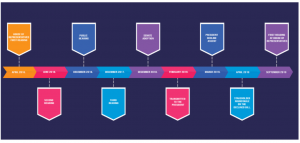
The Digital Rights and Freedom Bill (HB.490)
In 2019,The Digital Rights and Freedom Bill (HB.490) which we have worked on for 6 years was passed by the Nigerian Senate after the House of Representatives passed the Bill in 2019. The Bill was sent to Nigeria’s President Buhari who declined assent to the Bill in March 2019. As an immediate response, we hosted a stakeholder roundtable on the Bill in April 2019. The roundtable was attended by the following key government institutions such as the Nigerian Communications Commission, National Broadcasting Commission, Federal Ministry of Justice, National Information Technology Development Agency, National Human Rights Commission, Department of State Service, House of Representatives Committee on Human Rights, Web Foundation, Enough is Enough Nigeria, Centre for Information. The roundtable birthed a process of reviewing President’s Buhari’s reason for refusing assent to the Digital Rights and Freedom Bill with each stakeholder giving feedback on how to make the Bill better and addressing issues of concern to stakeholders. The issues that were flagged by Mr. President have now been reviewed and the stakeholders have had the opportunity to review the revised Bill with some of them providing feedback to make the Bill better. Also, within the year. The bill was sent back to the National Assembly for legislative consideration and passage and has passed first reading in the house of representatives.
Workshops and Advocacy
In 2019, we did advocacy responses to emerging legislation around hate speech and fake news in Africa. This included campaigns and collaboration with other partners in the industry especially in Africa. We also coordinated a global coalition statement addressing the development in Nigeria and a few other African
countries.
In October 2019, the team hosted the 2019 Regional Digital Rights Workshop for Anglophone West Africa in Abuja, Nigeria. Among the 20 participants who were sponsored by Paradigm Initiative, 14 were Nigerians, 3 were Ghanaians, 2 were from Liberia, 1 was from Gambia and 1 from Sierra Leone.
Earlier in 2019, we also organised a digital rights workshop in Kano with CSO s from the northern Nigeria state.
Strategic Litigation
Following our lawsuit against the National Identity Management Commission (NIMC) in Nigeria, The Court affirmed the data privacy rights of Nigerian citizens and directed the National Identity Management Commission (NIMC) to improve on its data privacy and security systems in order to avoid a breach of citizens’ rights to privacy. The judge instructed NIMC to put security measures in place. The Judge also commended us for our data privacy/protection advocacy
East Africa Regional Office – Arusha, Tanzania
The Paradigm Initiative Eastern Africa office opened in 2019 in Arusha,Tanzania. Under this Program research and monitoring of digital rights situation in the East Africa region was done, as a response to violations and developments several articles and press releases were published.
Legal memos were also drafted to respond to new laws including the Huduma Namba Bill in Kenya. PIN has been able to develop various digital rights case studies on real cases in the region such as “The case of Maxence Melo and the Right to Privacy” now been used for practical learning on digital rights.
Consistent follow up in the region also enabled PIN to respond to various internet shutdowns in the region including the shutdowns in Ethiopia and Sudan.The 2019 Digital Rights in Africa report captures the passing of oppressive regulations in Tanzania,the internet shutdowns and media cramp down in Sudan and Ethiopia and the violations of privacy in Rwanda.
PIN East African office has over the year joined hands with partners to support organizing digital rights workshops such as the Tanzania Digital Rights Workshop with Article 19,Pan African Lawyers Union and the inaugural East African School of Internet Governance,the East African Internet Governance Forum as well as forming part of the steering committee for the Tanzanian Internet Governance Forum.
In November 2019 PIN joined the International Jurist Commission Kenyan section at the Annual Jurist conference in Diani,Kenya to debate on Human Rights, Technology, new media and Civic space in relation to the rule of law.
Recognizing the role of activists in the movement for digital rights PIN also collaborated with African Rising to provide digital rights and security training to activists from Madagascar,The Gambia,Uganda,Chad,Cameroon,South Africa,Zimbabwe and DRC at the MSTCDC center in Arusha ,Tanzania.
Southern Africa Regional office – Lusaka, Zambia
In 2019, Paradigm Initiative opened it’s first office in the Southern region in Lusaka, Zambia. Under this Program, PIN hosted an Internet policy workshop for parliamentarians of East and Southern Africa in Nairobi, Kenya. As a result, a Coalition of Parliamentarians working to advance digital rights was born, with representation of over eight (8) countries from the two regions.
Through research and monitoring the digital rights situation in the region, the organisation published a policy brief on the Downside to VOIP tax in Zambia, responded to the eventful January 14th Internet shutdown in Zimbabwe and monitored elections in Botswana, Malawi, Mozambique and South Africa.
Three countries in the region- Malawi, Zambia and Zimbabwe featured in the Digital Rights in Africa report in the year in question, showing a growing trend in surveillance tactics and reduced tolerance for freedom of speech online, with over five (5) civilians jailed for social media postings. PIN also partnered with local stakeholders to launch the first ever Zambia Internet Governance Forum in November.
PIN joined forces with partners and collaborators such as Bloggers of Zambia, Zambia Ministry of Gender, UNDP, Bongohive, Zambia Cyber Security Initiative Foundation (ZSCIF), the Zambia National Assembly, African Union Commission and MISA Zimbabwe to train journalists and parliamentarians on digital rights, formulate a strategy for setting up ICT Hubs for girls in rural Zambia, commemorate World Cyber Security Month and World Press Freedom Day, and review the Zambia Civil Society Cyber Bill.
In addition to supporting other digital rights policy consultations and events, the organisation held awareness events and discussions, hosted a radio program and participated at RightsCon Tunis 2019 to highlight the scourge of gagging free speech in Africa and helped to shape conversations around elections and public discourse on the continent.
Francophone Africa
Since 2017, Paradigm Initiative has been active in the Francophone Africa region covering over 20 countries mostly in Central Africa, West Africa and North Africa.
In 2019, we opened our second office in Lomé, Togo to cover activities and programs in francophone West-Africa and North Africa. The Yaoundé office in Cameroon opened two-years earlier, has expanded our engagement beyond the Central African region.
In 2019, our activities in the region have started with evaluation of the digital landscape in the various countries and the review of exiting cyberlaws and digital rights policies. The team also monitored digital freedom and violations in the volatile region where arrests, network disruptions and internet shutdown have occurred repeatedly in recent years.
In Cameroon, Ensemble Cameroon, a coalition set up by Paradigm Initiative and local partners following a workshop with CSOs organisations, became more active and now functions as a veritable platform to identify digital rights violations, discuss intervention strategies, share opportunities and promote digital rights objectives in the country. In 2019, the coalition has organized several workshops and consultations for the Cameroon Digital Rights and Freedom Bill that the coalition is leading.
Still in Cameroon, Paradigm Initiative and its partners OONI and Netblocks have led an advocacy campaign against the censorship of CamerounWeb, the country’s most visited news portal. The website was opened following the campaign.
Others case such as the arrest of the country’s most wanted whistleblower Paul Chouta has retained our attention in Cameroon. Our pro-bono lawyer is part of the lawyers defending Mr. Chouta who is detained in maximum-security prison in the country.
Paul Chouta has now spent more than 6 months in prison, and is facing the prospect of years of imprisonment, for posting a video on social media.
In Togo, our team has collaborated with local partners to draft the country’s Digital Rights and Freedom Bill (DRFB).
Encouraged by our experience in Nigeria, the Digital Rights and Freedom Bill will provide progressive legislative backing to online speech in Togo, and also supports freedom of expression and privacy.
The Bill, when it becomes Law, will bring Togo’s domestic law, policy and practices with regards to the protection of human rights on the Internet into conformity with international norms. The bill will also help to boost an innovative online environment for Togolese, as well as accelerate the country’s development in the digital age.
At the regional level, Paradigm Initiative has organised its first digital rights workshops in Dakar, Senegal in October 2019, with 22 participants from 12 countries. Participants have highlighted the digital rights landscape in their countries and also learned advocacy strategies for multi-stakeholder engagement in the region.
Paradigm Initiative has also pushed back internet restrictions and digital rights violation in Benin, Chad, Gabon, DRC, Algeria, Guinea and Cameroon.
A special monitoring focus was given to countries that have organised election in the region, as elections usually coupled with most violations.
Our 2019 annual report on Digital Rights in Africa assesses the level of advancement of digital freedoms in four (4) countries in the region, namely Benin, Cameroon, the Democratic Republic of the Congo and Egypt.
A case study was also conducted on the impact of the 93-day internet shutdown in the two English-speaking in Cameroon.
Digital Rights and Inclusion Forum (#DRIF19)
In 2019, we hosted our annual Digital Rights and Inclusion Forum (#DRIF) in Lagos. A rendezvous that brought together internet freedom advocates, policymakers, the technical community, business groups, media and other stakeholder groups from across Africa and beyond to debate tough topical issues around digital rights and digital inclusion on the continent. The event attracted nearly 300 attendees from 38 countries (32 of which were African countries) in 2019.
84.6% of those who attended in 2019 rated the content of the forum excellent or very good, while 92.3% rated the same on relevance of the forum to their current and future work. Another 86.9% rated either excellent or very good on engagement and diversity. #DRIF20 is going to be bigger and better because of more engaging content from an even more diverse community.
The forum attracted media coverage from 15 media organizations and over 30 features online, 38 press articles and 8 broadcasts.
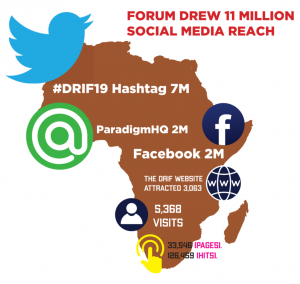
Digital Inclusion Program
In 2019, Paradigm Initiative digital inclusion programs continue to address the accessibility gap among underserved youth and communities in Nigeria through its LIFE and Dufuna training program. The programs provide participants with digital skills that would help them connect to opportunities in the digital space in other for them to improve their livelihoods.
In 2019, the LIFE program trained 274 youth from its host communities – Aba, Ajegunle and Dakata. The program had 3 Classes that seat 95 students at each training session across the centres. As we continue to bridge the gender gap in Nigeria, the LIFE program hosted young ladies from the communities we work on its Digital Readiness Workshop.
An initiative that encourages girls from underserved communities to embrace digital/technology tools to enhance their endeavours. From the 2 workshops that were hosted simultaneously across the centres, we have 220 girls in attendance.
The program’s effort to train secondary-school students continued in 2019 as the impact increases. The initiative now works with 14 secondary schools in Aba, Ajegunle and Dakata with 335 (208 boys and 127) students participating in the initiative.
Stakeholders, community influencers, volunteers and parents play a huge role in the success of our LIFE program, in other to get them to inform about what is happening in the program and get feedback from their experience, we organize town hall meetings yearly. For 2019, we had over 350 people in attendance and certificates were issued to 52 alumni of the program that met the program’s criteria. The program recorded a number of impacts in 2019.
The first cohort of the Dufuna Program commenced in October 2019 with 54 participants being trained to become a Software engineer.
Currently, participants are undergoing intensive training sessions (both online and offline) and interfacing with different projects to sharpen their skills. The participants will be faced with a hackathon session in March where their readiness will be tested.
Dufuna program promises to match participants with jobs and projects after the training. One of the current scholars Paul Akolade, got an offer to work with Beauty and Fragrance Limited and he resumed on January 13.
This month, a form was shared among scholars to indicate interest in interviewing with Konga and 8 of them have been invited for the interview.
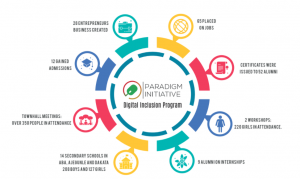
Research and collaborations
Digital Rights in Africa report 2019
We produced the digital rights in Africa report 2019, which gives an overview of the digital rights scene in Africa. The report covered 13 countries in North, South, East, South and Central Africa. The report covered digital rights violations, including illegal digital surveillance, Internet shutdowns and arrest of bloggers amongst others.
Nigeria elections through the lens of digital rights report
In April 2019, together with the Open Observatory of Network Interference (OONI), published the ‘’Nigeria elections through the lens of digital rights report’’. The report utilized network measurements, desk research and a survey to analyze the state of digital rights around the 2019 Nigerian elections.
Policy briefs
Our Program Offi cer, Digital Rights, Southern Africa and our Research Offi cer co-authored a policy brief titled, ‘’The Downside to VoIP tax: A case for Zambia. Paradigm Initiative Policy Brief’’, which examined the impact of VoIP tax regime in Zambia, off ering insightful analysis that furthers the conversation.

 (1)
(1)